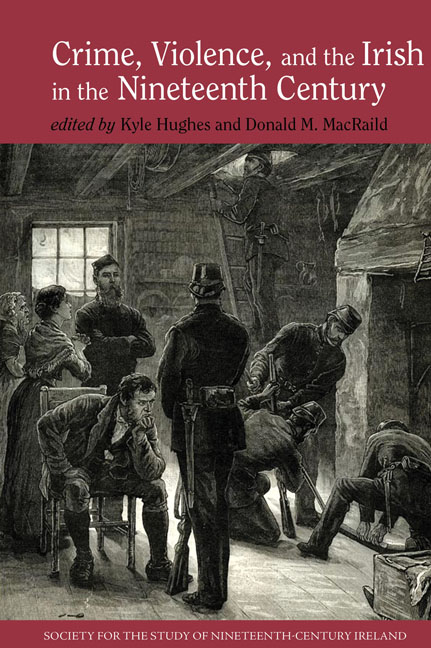Book contents
- Frontmatter
- Contents
- List of Illustrations
- List of Contributors
- Introduction: Crime, Violence, and the Irish in the Nineteenth Century; Themes and Perspectives
- Section 1 ‘Secret Societies’ and Collective Violence
- 1 Whiteboys and Ribbonmen: What's in a Name?
- 2 The Law of Captain Rock
- 3 ‘Night Marauders’ and ‘Deluded Wretches’: Public Discourses on Ribbonism in Pre-Famine Ireland
- 4 Organised Labour in Limerick City, 1819–1821: Violence and the Struggle for Legitimacy
- Section 2 The Law and its Responses
- Section 3 Sectarianism and Violence
- Section 4 Manifestations of Crime and Violence
- Index
2 - The Law of Captain Rock
from Section 1 - ‘Secret Societies’ and Collective Violence
- Frontmatter
- Contents
- List of Illustrations
- List of Contributors
- Introduction: Crime, Violence, and the Irish in the Nineteenth Century; Themes and Perspectives
- Section 1 ‘Secret Societies’ and Collective Violence
- 1 Whiteboys and Ribbonmen: What's in a Name?
- 2 The Law of Captain Rock
- 3 ‘Night Marauders’ and ‘Deluded Wretches’: Public Discourses on Ribbonism in Pre-Famine Ireland
- 4 Organised Labour in Limerick City, 1819–1821: Violence and the Struggle for Legitimacy
- Section 2 The Law and its Responses
- Section 3 Sectarianism and Violence
- Section 4 Manifestations of Crime and Violence
- Index
Summary
On Sunday, 9 January 1831, as John Foster of Ratorpe, near Gort, in south Galway, was on his way to church, he ‘was accosted by two men, who presented a letter, desiring he should read it. Upon his refusing to do so, they drew each from beneath his coat a pistol, and threatened him in case of non-compliance’. Foster took the letter, read it, and promised to accede to its stipulations. Foster had received a so-called threatening letter or threatening notice. The apparent incongruity of this episode lies not just in the seeming pointlessness of verbally threatening someone to force them to receive written threats. There is even more ostensive incongruity when we consider that typically such notices are interpreted as a means of anonymous communication, and, indeed, this seems to have been their main function. This episode, and others like it, underlines the need to understand the symbolic language of the notice, in terms of both the actual process of giving notice itself and the textual content of the notices.
This chapter is concerned with the representation within threatening notices of their authors as the agents of an alternative law, where what the notices threaten is punishment for perceived wrongdoing or, in other words, crime. Two different ways to understand this will be explored here; first, as an instance of legal parallelism, where two distinct laws operate in the same territory; and, secondly, as a response to cultural weight of the state's legal system. So the law of Captain Rock will be under consideration both as an actual law and as a representation, which is to say a way in which the issuers of notices expressed themselves. This will involve defining what we mean by law, examining custom and customary non-state means of social regulation, and exploring both the state's legal system and the act of giving notice itself as symbolic representations of authority. The overall point is to recover something of the meanings and interpretations the rural poor of pre-Famine Irish society gave to facets of their social world. An ontological perspective attentive to agency, and attentive to the ability of human action to shape the social world, necessitates a focus on culture and meaning.
- Type
- Chapter
- Information
- Crime, Violence and the Irish in the Nineteenth Century , pp. 38 - 52Publisher: Liverpool University PressPrint publication year: 2017

